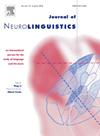Advances in our understanding of bilingual brain organization: A look back and a view forward
IF 1.2
3区 心理学
Q2 LINGUISTICS
引用次数: 0
Abstract
Multilingual and bilingual environments provide natural settings to study the implications of acquiring and developing competence in more than one language. Models of language processing have often focused on monolingual contexts, but researchers who live in countries where bilingualism and multilingualism are the norm, have an opportunity to extend these ideas; the work discussed here focuses on two such linguistic contexts, South Africa and Canada. In 1992, Klein and Doctor took inspiration from English-Afrikaans bilinguals to extend models of monolingual processing to bilingual individuals. Since then, Klein and colleagues have taken advantage of the unique language environment of Quebec, Canada, and the substantial possibilities arising from the burgeoning field of functional neuroimaging to explore how two languages exist in a single cognitive system and what that tells us about neural representations. More recently there has been a burgeoning of research in this field, examining also the implications of bilingual language processing for cognition more generally. Our paper reviews the progress made in the field, from the original findings of Klein and Doctor to key findings and advances that have taken place since then.
双语脑组织研究进展:回顾与展望
多语言和双语环境为学习掌握和发展一种以上语言能力的含义提供了自然的环境。语言处理模型通常侧重于单语语境,但生活在双语和多语是常态的国家的研究人员有机会扩展这些想法;这里讨论的工作集中在两个这样的语言背景下,南非和加拿大。1992年,Klein和Doctor从英语-南非荷兰语双语者身上获得灵感,将单语处理模型扩展到双语者身上。从那时起,克莱因和他的同事们利用加拿大魁北克独特的语言环境,以及新兴的功能性神经成像领域所带来的巨大可能性,探索两种语言如何在一个认知系统中存在,以及它告诉我们关于神经表征的什么。最近,这一领域的研究迅速发展,研究了双语语言处理对认知的影响。我们的论文回顾了该领域的进展,从Klein和Doctor的原始发现到此后发生的主要发现和进展。
本文章由计算机程序翻译,如有差异,请以英文原文为准。
求助全文
约1分钟内获得全文
求助全文
来源期刊

Journal of Neurolinguistics
医学-神经科学
CiteScore
3.90
自引率
5.00%
发文量
49
审稿时长
17.2 weeks
期刊介绍:
The Journal of Neurolinguistics is an international forum for the integration of the neurosciences and language sciences. JNL provides for rapid publication of novel, peer-reviewed research into the interaction between language, communication and brain processes. The focus is on rigorous studies of an empirical or theoretical nature and which make an original contribution to our knowledge about the involvement of the nervous system in communication and its breakdowns. Contributions from neurology, communication disorders, linguistics, neuropsychology and cognitive science in general are welcome. Published articles will typically address issues relating some aspect of language or speech function to its neurological substrates with clear theoretical import. Interdisciplinary work on any aspect of the biological foundations of language and its disorders resulting from brain damage is encouraged. Studies of normal subjects, with clear reference to brain functions, are appropriate. Group-studies on well defined samples and case studies with well documented lesion or nervous system dysfunction are acceptable. The journal is open to empirical reports and review articles. Special issues on aspects of the relation between language and the structure and function of the nervous system are also welcome.
 求助内容:
求助内容: 应助结果提醒方式:
应助结果提醒方式:


